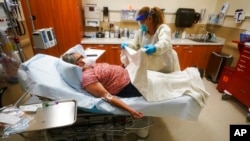Two COVID-19 antibody therapies are no longer recommended by the World Health Organization because omicron and the variant's latest offshoots have likely rendered them obsolete.
The two therapies — which are designed to work by binding to the spike protein of the virus to neutralize its ability to infect cells — were some of the first medicines developed early in the pandemic.
The virus has since evolved, and mounting evidence from lab tests suggests the two therapies, sotrovimab and casirivimab-imdevimab, have limited clinical activity against the latest iterations of the virus. As a result, they have also fallen out of favor with the U.S. health regulator.
On Thursday, WHO experts said they strongly advised against the use of the two therapies in patients with COVID-19, reversing previous conditional recommendations endorsing them, as part of a suite of recommendations published in the British Medical Journal.
GSK and partner Vir Biotechnology's sotrovimab, which has generated billions in sales and became one of GSK's top sellers last year, was pulled off the U.S. market by the U.S. Food and Drug Administration in April.
Given the United States had begun to question sotrovimab's clinical effectiveness against omicron as early as February, the WHO's realization is coming a little late, said Penny Ward, visiting professor in pharmaceutical medicine at King's College London.
"It will be interesting to see how many other countries align" with the WHO recommendation, she said.
Regeneron and partner Roche's antibody cocktail casirivimab-imdevimab has also generated billions in sales and was one of the U.S. drugmaker's top sellers last year.
Back in January, the FDA revised its stance on the treatment, limiting its use to a smaller group of patients, citing its diminished potency against the omicron variant.
Both therapies continue to be recommended for use by the European drugs regulator.
Another COVID-19 therapy that emerged early in pandemic was Gilead's antiviral remdesivir. The WHO narrowed its conditional recommendation for the drug, advising that it be used only in patients with severe COVID-19 due to its "modest" benefit.
A handful of existing COVID-19 therapies remain useful in the fight against the virus, and others in development are also expected to benefit patients.





